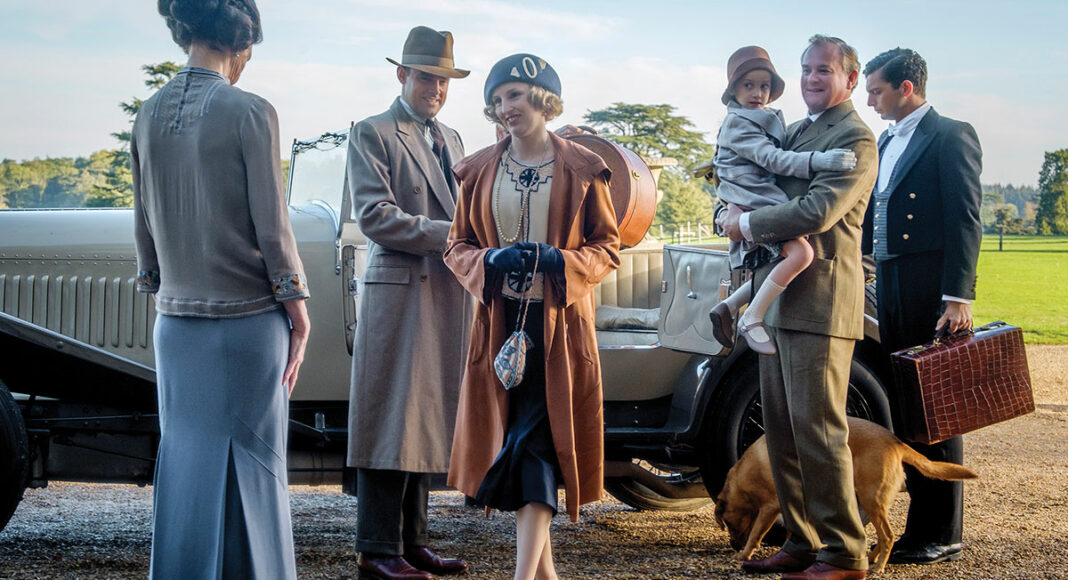No one knows Downton Abbey better than Julian Fellowes, creator and longtime scriptwriter for the insanely popular PBS television series—unless you count the untold gazillions of rabid fans who embraced the show during its five years on the air.
As a token of thanks, Fellowes treats his fans like royalty in the movie adaptation of Downton Abbey. We’re invited to join the king and queen of England on a visit to Downton, an event of such epic pomp and ceremony that it takes a big screen to contain it all.
The faithful will adore every juicy frame of the Crawley family’s cinematic adventure—the subtle rustling of every beaded gown (the year is 1927); every fashionably bobbed and waved hairdo; every pointed remark between beloved characters, both upstairs and downstairs. Beneath the dazzling narrative focus on the royals’ impending visit, the busy subplots are devoted to catching up with as many familiar characters as possible.
But there’s also just enough storyline skipping along the movie’s glittery surface to entertain the uninitiated, propelling things to a satisfying conclusion (or two), stylishly done.
Scripted by Fellowes for director Michael Engler, another Downton veteran, the movie takes a more lighthearted approach to storytelling, without so much of the angst that can be developed in the episodic TV format over time. The news that King George V and Queen Mary will be spending one night at Downton, en route to some other royal engagement nearby, throws the household into turmoil. It’s a huge honor for affable Lord Crawley and his American-born wife (Hugh Bonneville and Elizabeth McGovern). But while take-charge daughter Lady Mary (Michelle Dockery) faces a logistical nightmare, the downstairs staff frets over how they will feed, serve and wait upon such grand guests.
Turns out they may not get the chance when the royal traveling staff arrives to take over—complete with officious butler, waspish housekeeper, a snooty French chef (Philippe Courbet, straight out of a Monty Python routine), and an entire fleet of footmen and maids. To restore order, Lady Mary coaxes the former Downton butler, the indomitable Carson (Jim Carter), out of retirement. The image of Carson striding purposefully up the long and winding drive to Downton, shimmering on a hill like Camelot, is the movie’s most iconic moment.
When the Downton staff rebels at having to serve the very servants who are replacing them, a plot is hatched to take back their turf, led buy the ever-capable ladies’ maid Anna (Joanne Frogatt), steadfast valet Mr. Bates (Brendan Coyle), and feisty cook Mrs. Patmore (Lesley Nicol).
Meanwhile, Crawley’s son-in-law Tom Branson (Allen Leech) investigates a sinister stranger nosing around town in advance of the royals’ visit. And Downton’s current butler Thomas Barrow (Robert James-Collier)—coping with isolation, but determined to stay true to his sexual identity—finds an unexpected ally in a handsome, worldly young man from the royal entourage (Max Brown).
In another subplot, distant relation Maud Bagshaw (Imelda Staunton) is about to leave her estate to her young companion Lucy (Tuppence Middleton), provoking a showdown with Dowager Countess Violet Crawley (Maggie Smith), clan matriarch and staunch defender of the Crawley family legacy. Smith, of course, is Fellowes’ secret weapon. She makes an elegant feast out of every syllable he feeds her, and while the writing is impeccable, it needs Smith’s imperious, pitch-perfect delivery—especially her acerbic exchanges with Violet’s companion Isobel Merton (Penelope Wilton)—to steal every scene she’s in.
Chances are, if you have a favorite regular cast member, he or she is in here somewhere. The darker complexities of all their relationships can only be hinted at here, but at least Fellowes and company provide two hours of easy entertainment, with plenty to look at along the way.
DOWNTON ABBEY
*** (out of four)
With Hugh Bonneville, Michelle Dockery, Laura Carmichael, Jim Carter, Elizabeth McGovern, Imelda Staunton, Robert James-Collier, and Maggie Smith. Written by Julian Fellowes. Directed by Michael Engler. A Focus Features release. Rated PG. 122 minutes.












